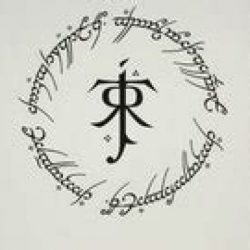Another highly debated topic amongst us nerds. Which Eldarin language is ‘easiest ‘ to learn, and why? What different benefits come from learning each? Why do so many of us pour hours into learning them when they’re ‘practically useless’?
I do not claim to be fluent in either of these languages, though I have some passable Sindarin, and rudimentary Quenya. In my opinion, Quenya is easier to learn if you already speak a language with noun inflection. There are 10 cases, making things quite difficult for those of us who aren’t used to even having more than one. Quenya is quite simple grammatically aside from that, and has a more extensive vocabulary, making it more useable. Sindarin does not use noun inflection, however, it has a complex system of mutation where consonants often shift depending on the grammatical or phonological placement of the word. While this may be difficult to memorize, it’s certainly easier than 10 cases when you’ve never spoken more than 1.
Yes, i am aware that there are few benefits to learning a mythical language out of a book. However, I advocate that people stop claiming that it is ‘useless’, or that they have no benefits whatsoever. There is a widespread community of Tolkien nerds all over the internet who pour hours into this. Wouldn’t it be great to be able to communicate with somebody who doesn’t speak your native language simply because you are both fans of the same book? But if you need something more solid, here is one of the biggest practical benefits of learning Elvish (primarily Sindarin, but this applies to both): Once you’ve learned it, every other language you want to learn will seem incredibly simple.
Now, just why do we put so much time and effort into this? For some people, they see it as a way to honour what Tolkien created. For others, bringing such a crucial part of his world into ours helps to bring them closer to the core themes and helps them understand the deeper morals of the legendarium at a much deeper level. Some reasons aren’t as deep; my friend and I tried to learn it simply as a secret language so have secret conversations to keep secrets from the memeable-content-hunters who need to find all of your embarassing moments. While she soon fell away when the journey got difficult, I held on. We all do it for our own reasons. I simply do it for the fun of it. I get so much joy when, while re-reading the books for the forty-second time, I stumble across some Sindarin phrase that I understand. Annon Edhellen, edro hi ammen! Fennas nogothrim, lasto beth lammen!


